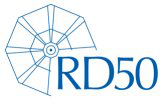Speaker
Description
The new ATLAS Inner Tracker (ITk) sub-detector is necessitated by the impending High Luminosity Large Hadron Collider (HL-LHC) upgrade. This replacement is part of the phase-II upgrade programme for the HL-LHC which will see a sevenfold increase in peak instantaneous luminosity with a total ionizing dose of 53 MRad. The fully solid state ITk will employ silicon n+-in-p microstrip sensors in the outer layers of the tracking detector. The main sensors are manufactured on 6” diameter silicon wafers. Periphery wafer area (halfmoons) to which the main sensor does not extend serves as convenient venues for the implementation of test devices. The primary utility of the test devices is Quality Assurance (QA), that is, the monitoring of the consistency and reliability of the manufacturing process. A Metal-Oxide-Semiconductor (MOS) and Gate-Controlled Diode (GCD) are two such test devices aimed at characterizing the surface oxide and silicon-oxide interface. Measurement procedures and parameters for QA are established for these devices and the viability of these tests for gamma irradiated samples is evaluated. The suitability of these devices to further monitor the strip sensor fabrication process is also investigated.
